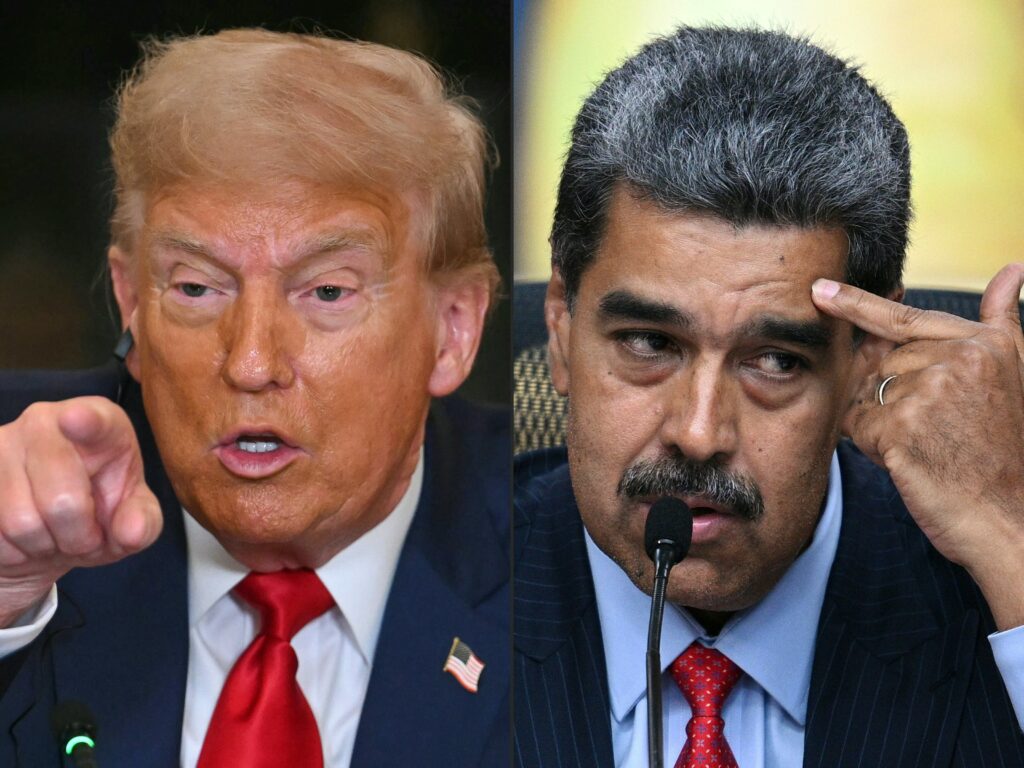Trump hails capture of Maduro as US vows legal ‘wrath’
President Donald Trump on Saturday hailed the capture by the US military of Nicolas Maduro, as his attorney general vowed the Venezuelan leader would face the “full wrath” of American justice.Maduro and his wife both face drug and terrorism charges in the United States, which has waged a months-long pressure campaign against the leftist president.In a stunning denouement, the US army’s elite Delta Force snatched the Maduros as bombs fell on Caracas, US media reported, with Trump set to give further details in a press conference at 11:00 am (1600 GMT).”The United States of America has successfully carried out a large scale strike against Venezuela and its leader, President Nicolas Maduro, who has been, along with his wife, captured and flown out of the Country,” Trump said on Truth Social.”This operation was done in conjunction with U.S. Law Enforcement,” added Trump, who is at his Mar-a-Lago residence in Florida, near the end of a two-week Christmas and New Year’s vacation.In a brief phone interview with The New York Times, Trump said “it was a brilliant operation, actually.””A lot of good planning and lot of great, great troops and great people,” the paper quoted Trump as saying — adding that he did not answer a question about whether he had sought congressional approval.US Attorney General Pam Bondi said Maduro and his wife Cilia Flores had been indicted in the Southern District of New York on charges including “Narco-Terrorism Conspiracy,” conspiracy to import cocaine, and charges related to machineguns.”They will soon face the full wrath of American justice on American soil in American courts,” Bondi said on X.The indictment against Maduro was lodged in 2020 while the indictment against his wife was not previously known. Trump’s administration in August doubled a reward for information leading to his capture to $50 million, accusing him of leading the alleged “Cartel of the Suns” drug trafficking organization.- ‘The tyrant is gone’ -The US military action was now complete with “no further action in Venezuela now that Maduro is in US custody,” a senator quoted Secretary of State Marco Rubio as saying.The strikes on Venezuela were designed to “protect and defend those executing the arrest warrant,” said Mike Lee, a Republican initially critical of the operation, wrote on X. Rubio meanwhile reposted a social media message from earlier this year in which he said Maduro was not the legitimate president of Venezuela following elections that international observers said were riddled with irregularities.Rubio’s number two hailed a “new dawn” for Venezuela. “The tyrant is gone. He will now — finally — face justice for his crimes,” Deputy Secretary of State Christopher Landau wrote on X.Trump has given differing arguments for his campaign against Venezuela, including the claim that the country is a major drug exporter to the United States and that Venezuela seized US oil interests.The US president said in December “it would be smart for (Maduro)” to step down and has also said that the Venezuelan leader’s “days are numbered.”But the Maduro capture — along with US strikes on Nigeria on Christmas Day — also come despite Trump billing himself as a “peace president” who should win the Nobel Prize.Asked by reporters on New Year’s Eve what his resolution for 2026 was, Trump replied: “Peace on Earth.”Trump’s claim of Maduro’s capture comes just two days after the Venezuelan attempted renewed engagement, offering cooperation on fighting drug trafficking and illegal migration.The capture of Maduro came — coincidentally or not — on the anniversary of Panamanian leader Manuel Noriega’s surrender to US forces on January 3, 1990. Noriega was then tried and jailed in the United States.It also comes on the anniversary of a US strike that killed Iranian Revolutionary Guards commander Qasem Soleimani on January 3, 2020, in Baghdad.
US bombs Venezuela and captures Maduro, according to Trump
President Donald Trump said Saturday that US forces had captured Venezuela’s leader Nicolas Maduro after bombing the capital Caracas and other cities in a dramatic climax to a months-long standoff between Trump and his Venezuelan arch-foe.In a series of fast-moving events, Caracas was rocked by explosions, accompanied by the sound of attack helicopters, around 2:00 am (0600 GMT).The strikes, which targeted a major military base and an airbase, among other sites, continued for nearly an hour, AFP journalists said.”The United States of America has successfully carried out a large scale strike against Venezuela and its leader, President Nicolas Maduro, who has been, along with his wife, captured and flown out of the Country,” Trump said on Truth Social, around two hours after the attacks began.Attorney General Pamela Bondi said in a post on X that Maduro and his wife would face “the full wrath of American justice on American soil in American courts” over drug and terrorism charges.Deputy Secretary of State Christopher Landau hailed “a new dawn for Venezuela,” on X adding: “A tyrant is gone.”The Venezuelan government accused the United States of an “extremely serious military aggression” and called for an emergency meeting of the UN Security Council.Vice President Delcy Rodriguez said she did not know the whereabouts of Maduro and his wife, Cilia Flores, speaking to Venezuelan TV by telephone. Rodriguez demanded that Washington provide “proof of life” of Venezuela’s leader of the past 12 years, whose re-election in 2024 elections was widely dismissed by the international community as fraudulent.Russia, a leading Venezuela ally, condemned the “armed aggression” and demanded “immediate” clarity about Maduro’s fate, its foreign ministry said in a statement.US Senator Mike Lee quoted Secretary of State Marco Rubio in a call as saying that Maduro would “stand trial” in the United States, where he is wanted on charges of drug trafficking.Trump said he would give a news conference at 11:00 am (1600 GMT) at his Mar-a-Lago residence in Florida, where he is on vacation.Venezuelan opposition leader, Nobel Peace Prize laureate, Maria Corina Machado, had yet to react to the latest events.In a post on X on December 31, the US-backed Machado had expressed confidence that 2026 would bring “consolidation of our nation’s liberty.” – A ‘brilliant’ operation -Venezuelans had for months been bracing for attacks on its territory, following repeated threats by Trump to escalate his campaign against Maduro’s administration.Trump hailed a “brilliant” operation which involved “a lot of good planning and lot of great, great troops and great people,” in a brief phone interview with The New York Times.Fort Tiuna, Venezuela’s largest military complex, situated in the south of Caracas, and Carlota airbase in the north were among the targets of the strikes.La Guaira, north of the capital, where Caracas’ airport and port are located, was also struck. “I felt like (the explosions) lifted me out of bed, and I immediately thought, ‘God, the day has come,’ and I cried,” Maria Eugenia Escobar, a 58-year-old resident of La Guaira, told AFP.The government said Maduro had declared a state of emergency but the 63-year-old socialist, who as recently as Thursday offered to cooperate with the United States, was nowhere to be seen.The defense ministry accused the United States of targeting residential areas and announced a “massive deployment” of its military resources.Iran, Cuba and Colombia’s leftist leader Gustavo Petro condemned the attacks, while the EU’s top diplomat urged restraint in a call with Rubio.Meanwhile, Spain offered to mediate in the crisis in an attempt to broker a negotiated and peaceful solution.Petro said he was deploying troops to the border with Venezuela.No casualty figures were immediately available.Residents of Caracas rushed to their windows and terraces to try to make sense of events as the bombings began.Others hid in safe, windowless spaces, fearful of breaking glass.Some social media users celebrated Trump’s claims that he deposed the unpopular Maduro, while others rejected what they saw as Trump’s war-mongering.- ‘They’re bombing’ -Francis Pena, a 29-year-old communications professional living in eastern Caracas, told AFP that he was sleeping and his girlfriend said “they’re bombing.””I can’t see the explosions, but I hear the planes. We’re starting to prepare a bag with the most important things at home — passport, cards, cash, candles, a change of clothes, canned food,” Pena said.Trump deployed an aircraft carrier and several warships to the Caribbean late last year as part of what he initially presented as an anti-drug smuggling campaign.But in recent weeks, he has had made no secret of his hope to unseat Maduro from his position.On Monday, Trump said it would be “smart” for the Venezuelan to step down and announced that the the US had hit and destroyed a docking area for alleged Venezuelan drug boats.The Trump administration has also accused Maduro of heading a drug cartel.Venezuela rubbished the claims, saying Washington was seeking to overthrow him because Venezuela has the largest known reserves of oil on Earth.As part of an escalating pressure campaign, Washington informally closed Venezuela’s airspace, imposed more sanctions and ordered the seizure of tankers loaded with Venezuelan oil.US forces have also carried out numerous strikes on boats in both the Caribbean Sea and eastern Pacific Ocean since September, targeting what Washington says are drug smugglers, that have killed at least 107 people, according to the US military.
Saudi-backed forces make advances in Yemen’s Hadramawt says military
Saudi-backed troops on Saturday made advances in Yemen’s resource-rich Hadramawt province, military officials said, as confrontations between forces backed by Riyadh and Abu Dhabi deepened a rift between the two Gulf allies.The Saudis and Emiratis have for years supported rival factions in Yemen’s fractious government. But a recent offensive by the UAE-backed secessionist Southern Transitional Council (STC) to capture Hadramawt angered Riyadh and left the oil-rich regional powers on a collision course.In a statement, the military of the Saudi-aligned government announced that “all military and civilian facilities” in Mukalla, the capital of Hadramawt province, had “been secured” by Riyadh-backed forces.Earlier two government military officials told AFP they had taken control of Mukalla’s principal military base. The Saudi-led coalition has launched repeated warnings and air strikes over the past week, including one on an alleged Emirati arms shipment to the STC.On Friday, a strike on the Al-Khasha military camp in Hadramawt left 20 dead, according to the separatist group.On Saturday, a military official with the STC told AFP Saudi warplanes had carried out “intense” air strikes on another of the group’s camps at Barshid, west of Mukalla.The official said the strike had resulted in fatalities, without giving a number of those killed.Footage aired by the Aden Independent Channel showed the moment one strike hit the STC forces, igniting a massive orange fireball and sending a plume of black smoke into the sky. – ‘Retreat of forces’ -According to an AFP journalist, gunfire could be heard in Mukalla early Saturday. While residents described a security breakdown there accompanied by looting, Saudi-backed forces appeared to advance with little resistance. Hani Yousef, a Mukalla resident, said he “saw retreating forces using their military vehicles to transport motorbikes and household items, including refrigerators and washing machines”.In the province’s city of Seiyun, 160 kilometres (100 miles) northwest of Mukalla, a government military official said pro-Saudi forces had taken control of the airport, targeted in Friday’s strikes, as well as administrative buildings.”We are working to secure them,” the military official said. The STC military official said: “There has been a retreat of our forces and we are resisting the attacking forces in Seiyun.” “We carried out a complete withdrawal from the areas of Al-Khasha… as a result of pressure from Saudi air strikes on us,” he added.Residents in Seiyun also said they heard gunfire and clashes. – Call for dialogue -Saudi Arabia on Saturday called for dialogue between factions in southern Yemen. In a statement posted to social media, the Saudi foreign ministry called for “a comprehensive conference in Riyadh to bring together all southern factions to discuss just solutions to the southern cause”.Riyadh said the Yemeni government had issued the invitation for talks.Also on Saturday, the UAE urged Yemenis to “halt escalation and resolve differences through dialogue”. The STC is now pushing to declare independence and form a breakaway state, which would split the Arabian Peninsula’s poorest state in two.On Friday the separatists announced the start of a two-year transitional period towards declaring an independent state and said the process would include dialogue and a referendum on independence.STC president Aidaros Alzubidi said the transitional phase would include dialogue with Yemen’s north — controlled by Iran-backed Houthi rebels — and a referendum on independence.But he warned that the group would declare independence “immediately” if there was no dialogue or if southern Yemen was attacked again.The Saudi-backed coalition was formed in 2015 in an attempt to dislodge the Houthi rebels from Yemen’s north. But after a brutal, decade-long civil war, the Houthis remain in place while the Saudi and Emirati-backed factions attack each other in the south.
Venezuela: la gauche condamne fermement l’attaque américaine, l’extrême droite plus nuancée
Des responsables de gauche, Jean-Luc Mélenchon en tête, ont dénoncé samedi “l’enlèvement” du président vénézuélien Nicolas Maduro par les forces américaines et appelé Paris à le condamner, tandis que l’extrême droite s’est montrée bien plus nuancée.”Les USA de Trump s’emparent du pétrole du Venezuela en violant sa souveraineté avec une intervention militaire d’un autre âge et l’enlèvement odieux du président Maduro et de son épouse”, a dénoncé sur le réseau social X l’Insoumis Jean-Luc Mélenchon.”Quelqu’un réveille le président Macron ? Il est temps que la République française condamne l’attaque contre le Venezuela. Il n’y a pas de bonne invasion. Seulement des mauvaises”, a-t-il ajouté, les autorités françaises étant pour l’heure restées muettes.Le président américain, Donald Trump, a annoncé samedi que ses forces avaient “capturé et exfiltré” Nicolas Maduro et son épouse lors d’une opération “de grande envergure” au Venezuela.Donald Trump accuse le président Maduro d’être à la tête d’un vaste réseau de narcotrafic, ce que l’intéressé dément, reprochant aux Etats-Unis de vouloir le renverser pour s’emparer des réserves de pétrole du pays, les plus grandes de la planète.Jean-Luc Mélenchon a estimé que le narcotrafic était un “prétexte” pour “détruire ce qu’il reste d’ordre international libre de la loi du plus fort”.M. Mélenchon est régulièrement accusé d’être un soutien du président vénézuélien Nicolas Maduro, ce qu’il récuse, même si Hugo Chavez était un de ses modèles politiques. Le patron du Parti socialiste Olivier Faure a lui affirmé sur X que “quoi que l’on pense de Maduro, cet acte doit être unanimement condamné”.Jugeant que “la force ne peut remplacer le droit”, il s’est inquiété d'”un feu vert donné à tous les autocrates du monde”.Le coordinateur de La France Insoumise Manuel Bompard a déclaré que les Etats-Unis “renouent avec les coups d’Etat et la guerre”.- Appel au rassemblement -Plus largement, LFI a enjoint dans un communiqué “le gouvernement français à condamner sans ambiguïté cette guerre, à exiger un cessez-le-feu immédiat et à défendre la souveraineté du Venezuela. Dans l’immédiat, elle doit demander une réunion du conseil de sécurité de l’ONU”.Le parti de gauche radicale a appelé à un rassemblement de “soutien au peuple vénézuélien” samedi à 18H00, place de la République à Paris. Le parti communiste, qui appelle aussi ses militants à se réunir samedi à 15H00 autour de la statue de Bolivar, dénonce pour sa part un “scandale absolu”. “La France doit réagir fermement”, a exhorté son N.1 Fabien Roussel sur X.La cheffe des Ecologistes Marine Tondelier a de son côté plaidé pour que la France condamne les bombardements nocturnes au Venezuela, sans mentionner la capture de Nicolas Maduro.A l’autre bout du spectre politique, le président du Rassemblement national Jordan Bardella s’est montré moins tranché.Si “personne” ne regrettera le “régime rouge” de Nicolas Maduro, “le respect du droit international et de la souveraineté des États ne peut être à géométrie variable”, a-t-il écrit sur X.Jordan Bardella a appelé à ce que “la parole soit rendue dans les plus brefs délais au peuple vénézuélien, afin qu’il puisse sortir de cette crise majeure par un processus démocratique libre, transparent et loyal”.Eric Ciotti, dont le parti UDR est allié du RN, a même salué la “chute du dictateur Maduro”.”Cette bonne nouvelle pour le peuple vénézuélien doit s’intégrer dans le respect du droit international”, a-t-il dit, demandant “un processus démocratique”.




